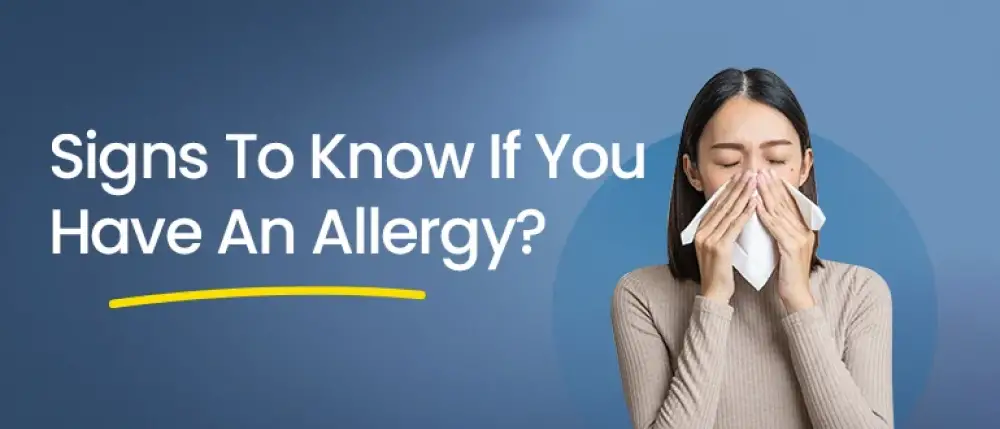Subscribe to get weekly insights
Always stay up to date with our newest articles sent direct to your inbox
Published on 13 Aug, 2024
1434 Views
4 min Read

Written by Riya Lohia
favorite0Like
favoriteBe the First to Like
Have you ever wondered if your sneezing fits are more than a dramatic dust response? Or why do your eyes start to water every spring? It might be more than a coincidence—welcome to the whimsical world of allergies!
Allergies are common and can disturb your whole routine. Allergy symptoms include constant sneezes, headaches, body aches, runny noses, upset stomachs, and whatnot. Most cases are of seasonal allergies that occur during the months of season change when the climate transitions from hot to rainy and winter. During these months, the body tries hard to adjust, and the chances of catching the flu and allergies are high. This is when doctors witness most patients complaining of allergies and flu.
Allergies usually resolve on their own within a few days or a week. However, in some cases, the person may require serious medical attention to avoid life-threatening conditions. Such cases are rare. To understand when you need to see a doctor, you need to understand allergy symptoms and their severity. So, read on to learn about types of allergies, their symptoms, causes, and available treatments.
An allergic reaction, rash, or other symptoms indicate your body is fighting against a foreign harmful substance. An allergy occurs when you come into contact with a foreign substance like pollen, bee venom, pet dander, or simply a food that usually isn't harmful to most people. In such cases, your body recognises the substance as harmful, irrespective of whether or not they are, and starts fighting against it. In such cases, the body produces antibodies, which, in return, cause allergic reactions like rashes, sinusitis, inflammation of the skin, digestive problems, etc.
In most cases, allergy reactions are limited to minor discomfort and irritation which may last a few days or a week. In some cases, it may turn into anaphylaxis, a life-threatening condition. Immediately medical attention and complete rest can help in quick recovery.
What substances can trigger an allergy in a person? Well, there are many. While a person may be immune to some of these and not others. Common allergy causes include:
Depending on the type of allergy, the symptoms may also differ. From airways to nasal passages, and the digestive system to the skin, allergic reactions can affect all body parts. Here is a detailed list of various allergy symptoms depending on the allergy type:
It happens when your body reacts to certain food content. It may not affect other people, but your immune system may consider it harmful and start preparing antibodies. The symptoms in such cases can be:
Dust, pollen, or pet dander can cause allergies.An inhalant allergy refers to allergies caused by something you have inhaled. The symptoms may include:
Certain medicines can also cause allergies to some people. Common symptoms include:
Bugs and bees have venom which can cause allergies. Common symptoms are:
Some people may get allergies after touching natural rubber latex. It usually occurs with repeated use of the latex. Common symptoms may include:
These are common allergies and their symptoms. Anaphylaxis is a severe allergy reaction that can develop into life-threatening conditions. Medical attention is the best solution in such cases. Allergy treatment depends on the severity of the case and the type of Allergy reaction. Your doctor may be able to advise on the best remedy.
Allergies can go away in hours or days, depending on the type of allergy. There comes a need to consult a doctor when the allergy symptoms persist for longer than usual, say over a week. In such a case, it is best advised to consult a doctor immediately. An allergist can help you diagnose the cause behind your allergy symptoms and the best treatment. Allergy treatment may include:
Commonly present steroids and corticosteroids can be prescribed in the form of pills, skin applicants, eye drops, inhalers, or sprays
Allergy shots and sublingual immunotherapy are standard immunotherapy solutions. It helps prevent allergic reactions and also helps reduce allergy symptoms
Different types of medications can be prescribed to decrease allergy symptoms. Common ones include:
Allergies can irritate and disturb your mood. Living with specific long-term allergies can be another challenge. However, it can be easier to treat with sufficient care and following a doctor's prescription. Make sure you do not delay and wait for allergy symptoms to settle on their own if the situation persists longer. Care Health Insurance makes it easier to seek quality medical advice without worrying about hefty expenses. Invest in a comprehensive health plan today!
>> Also Read: Get Your Allergies Treated by Home Remedies
Disclaimers: The above information is for reference purposes only. For more details about the health insurance plans and their benefits please refer to the sales prospectus, policy terms, and conditions.
favoriteBe the First to Like
Thyroid : मामूली नहीं हैं महिलाओं में थायराइड होना, जानें इसके लक्षण और घरेलू उपचार Vipul Tiwary in Diseases
शुगर कंट्रोल कैसे करे? जानें, डायबिटीज में क्या खाना चाहिए Vipul Tiwary in Health & Wellness
हाई ब्लड प्रेशर को तुरंत कंट्रोल कैसे करें? देखें इसके उपाय Vipul Tiwary in Diseases
पैरों में दर्द किस कमी से होता है? जानें, इसके घरेलू इलाज Vipul Tiwary in Health Insurance Articles
Cold Hands? Act Immediately Against Raynaud’s Phenomenon Jagriti Chakraborty in Diseases
Understanding Azotemia: Meaning, Causes, Treatment & ICD 10 Guide Leena Khowal in Diseases
Prolactin Hormone: Functions, Normal Levels, Causes, Symptoms & Treatment Guide Yashita Sinha in Diseases
Lymphatic Filariasis: The Silent Parasite Millions are Ignoring Jagriti Chakraborty in Diseases
Always stay up to date with our newest articles sent direct to your inbox
Loading...